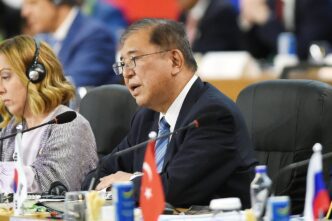Executive Summary
- Japan and the European Union are bolstering collaboration on economic security and free trade to navigate global economic challenges.
- This renewed cooperation addresses issues such as high tariffs from the United States and strategic reliance on critical minerals from China.
- The commitment builds on a comprehensive alliance launched in July, aiming to deepen collaboration across trade, economic security, and innovation to reinforce free trade principles and bolster supply chain resilience.
The Story So Far
- Japan and the European Union are bolstering their collaboration on economic security and free trade due to shared global economic challenges, including high tariffs from the United States and strategic reliance on critical minerals from China. This renewed commitment builds upon a comprehensive alliance launched in July, which aims to deepen cooperation across trade, economic security, and innovation, reflecting a mutual understanding of the strategic importance of a robust, independent economic partnership for safeguarding supply chains and technological advancements.
Why This Matters
- This renewed commitment between Japan and the EU to bolster economic security and free trade represents a strategic effort to counter global challenges, including high US tariffs and dependence on critical minerals from China, ultimately aiming to reinforce multilateralism, enhance supply chain resilience, and collaboratively shape international economic policies and innovation.
Who Thinks What?
- Japanese Prime Minister Shigeru Ishiba and European Commission Executive Vice President Stephane Sejourne both emphasized the critical necessity of deeper cooperation between Japan and the EU to shape global economic policies, establish international rules, and foster shared economic resilience through tangible collaboration.
- Japan and the EU, as blocs, are strategically committed to bolstering multilateral cooperation on economic security and free trade to navigate global economic challenges, reinforce free trade principles, and bolster supply chain resilience.
Japan and the European Union have committed to bolstering their collaboration on economic security and free trade, a move affirmed during a recent meeting between Japanese Prime Minister Shigeru Ishiba and European Commission Executive Vice President Stephane Sejourne. This renewed emphasis on cooperation comes as both blocs navigate global economic challenges, including high tariffs from the United States and strategic reliance on critical minerals from China.
Strategic Alliance Strengthened
The commitment builds upon a comprehensive alliance launched in July, which seeks to deepen collaboration across trade, economic security, and innovation. This framework provides a structured approach for both regions to align their strategies in an evolving global economic landscape.
Prime Minister Ishiba underscored the necessity of this cooperation in shaping global economic policies and international rules. He also emphasized the importance of tangible collaboration between Japanese and European companies to drive shared economic resilience and foster innovation.
Echoing Ishiba’s sentiments, Executive Vice President Sejourne affirmed the critical need to further deepen the cooperative relationship between Japan and the EU. This alignment reflects a mutual understanding of the strategic importance of a robust, independent economic partnership, particularly in safeguarding supply chains and technological advancements.
Key Takeaways
The renewed commitment between Japan and the EU highlights a strategic pivot towards enhanced multilateral cooperation in the face of geopolitical and economic pressures. Their joint efforts are set to reinforce free trade principles and bolster supply chain resilience across key sectors, aiming to create a more stable and predictable international economic environment.








